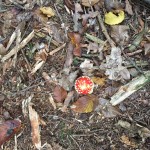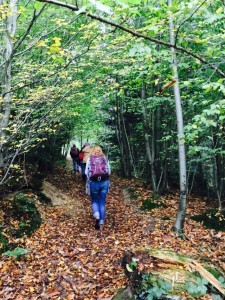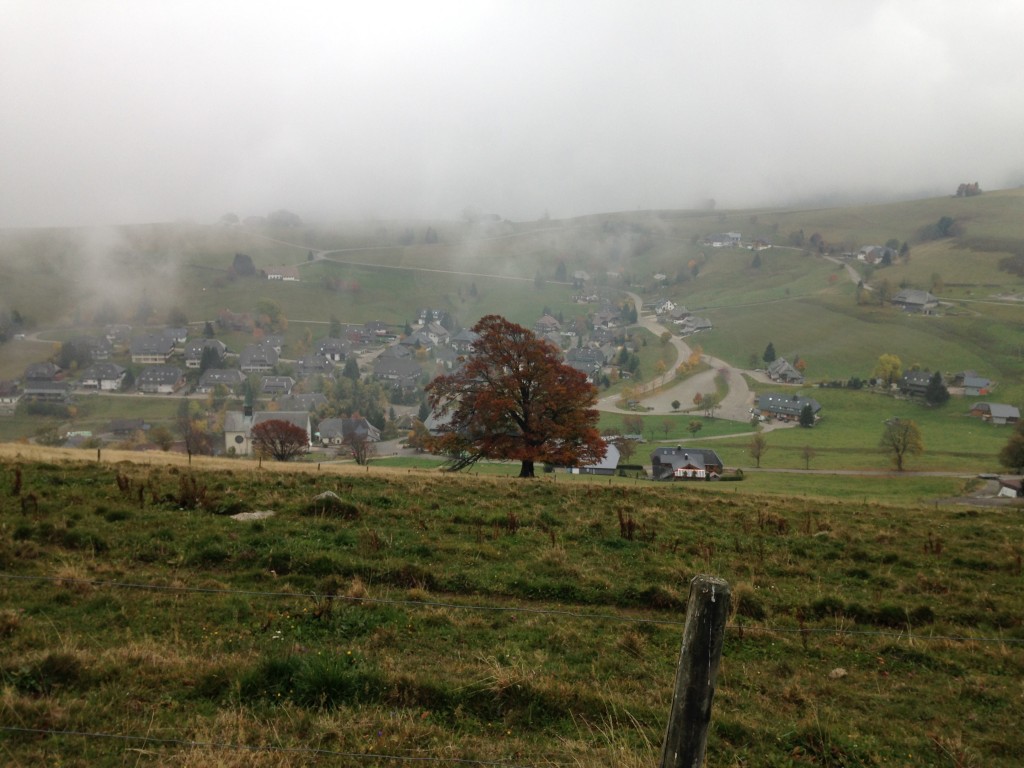Snowy forest near
St Peter makes us pine for
renewable heat.
Tag Archives: Hiking
Don’s Daily Haiku
Quote
Train, bus and our feet
carry us into cool clouds
where sun is now weak.
Getting up (and around and over and down and back around) a Hill
I am pleased to report that everyone made it to breakfast this morning, resilient, despite jet lag. After bundling up to face the brisk and cloudy day, we joined our guide from Innovation Academy on a tram ride out to the Forstamnt, about fifteen minutes from the city center.
This is the city-owned edge of the Black Forest, which is in and around Freiburg, meaning that about 40% of the city proper is covered in trees.For our tour of the forest, we were lucky to be hosted by the head ranger, who oversees all the ecological projects and maintenance of the local forest. As he led us up groomed paths and through new growth forest, both of today’s student commentators, Chanel and Meghan, were surprised to hear that “land use isn’t bad, as long as you use it in a sustainable way”. We learned that the forest is both an economic and cultural resource to the region – every five to six years, a single tree in a given section is cleared and sold for timber. Each selection is made after careful analysis of the surrounding growth, consideration for the biodiversity, and value of the wood in question.
In the States, we learn about the differences between conservation and preservation, and I have always considered myself a conservationist. Seeing this perspective, though, has suggested to me that we can and should interact with the land, because it’s there and it’s to be used. It’s interesting to try to have this balance of nature and natural approaches, but in order to keep that, everything has to be actively monitored. How much is it a natural progression and how much do we keep it the same? -Meghan
As our conversation went on, Chanel wondered whether the analytical and economic approach makes the Forstamnt more of a farm than a forest. “They are cultivating things specifically, and it’s all about yield, and what you can extract.” This new perspective on land use and protection of forests will give the students a new lens through which to analyze public policy, they think.
The ranger also emphasized that the forestry work they do is a very long-sighted project. Decisions they make today won’t have particularly visible impacts for 50-60 years, but the citizens are told to trust their expertise. Meghan found this a lot like some of the policies suggested to developing nations – technologies that might raise standards of living are discouraged because industrialized countries have experienced and abused them in their own pasts.
After a few more modes of public transportation, including a gondola ride (shrouded in mist, usually offering a lovely view of the city and surrounding valleys), and a lunch of goulash and spatzle, we hiked to the top of Schauinsland, the highest mountain owned by the city (though not the highest in the region). It also boasts a climate monitoring station with the longest continuous atmospheric CO2 record in Europe – they’ve been keeping data since 1972. Here, the students had a chance to learn about the equipment in use and the different organizations using the data collected there. Chanel noted that one of the scientists there made a similar point to an oft-mentioned concern in their readings, that there is “a difference in improvement of air quality and greenhouse gasses,” the latter being a global problem that “some countries don’t take seriously,” said the scientist.
We left the climate monitoring station and hiked up, over, past goats, around, through a cow pasture, and down the mountain to visit Schneiderlihof, an old farm house now set up as a museum highlighting the farming traditions of the Black Forest. Although the farm wasn’t necessarily sustainable in its functioning days, Meghan sees the self-sufficient mindset of that past carried forward to the present day relationship Germans have to nature and their forests.
Tomorrow, our day is a little more indoors and a little less uphill, as we meet with the founders of the Öko-Institut, a research collective vital to the region’s leadership in sustainable and anti-nuclear energy development.
About our guest commentators:
Meghan Wingate is a junior Political Science major at Haverford College. Growing up in Vermont, she was always casually involved in environmental groups and activities, but coming to Haverford solidified her academic interest too. She regularly wears her environment love on her sleeve, whether she’s studying policy, playing Ultimate with the Bi-Co Sneeches, or working on the Haverford Farm.
Chanel Williams is a senior at Bryn Mawr College. She is a Growth and Structure of Cities major, and also a past 360 participant (read about her class experiences in Hamburg here). As a student from the Bahamas, this cluster was particularly interesting because case studies on the Maldives covered in the Political Science course are echoes of the Bahamanian situation. She’s also an avid swimmer and water polo player, so she has high hopes for global sea level rise.



